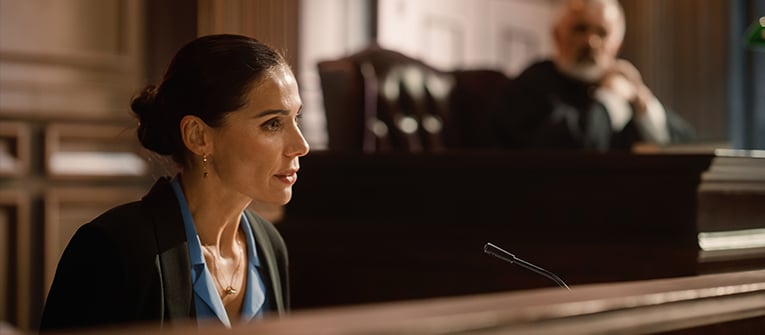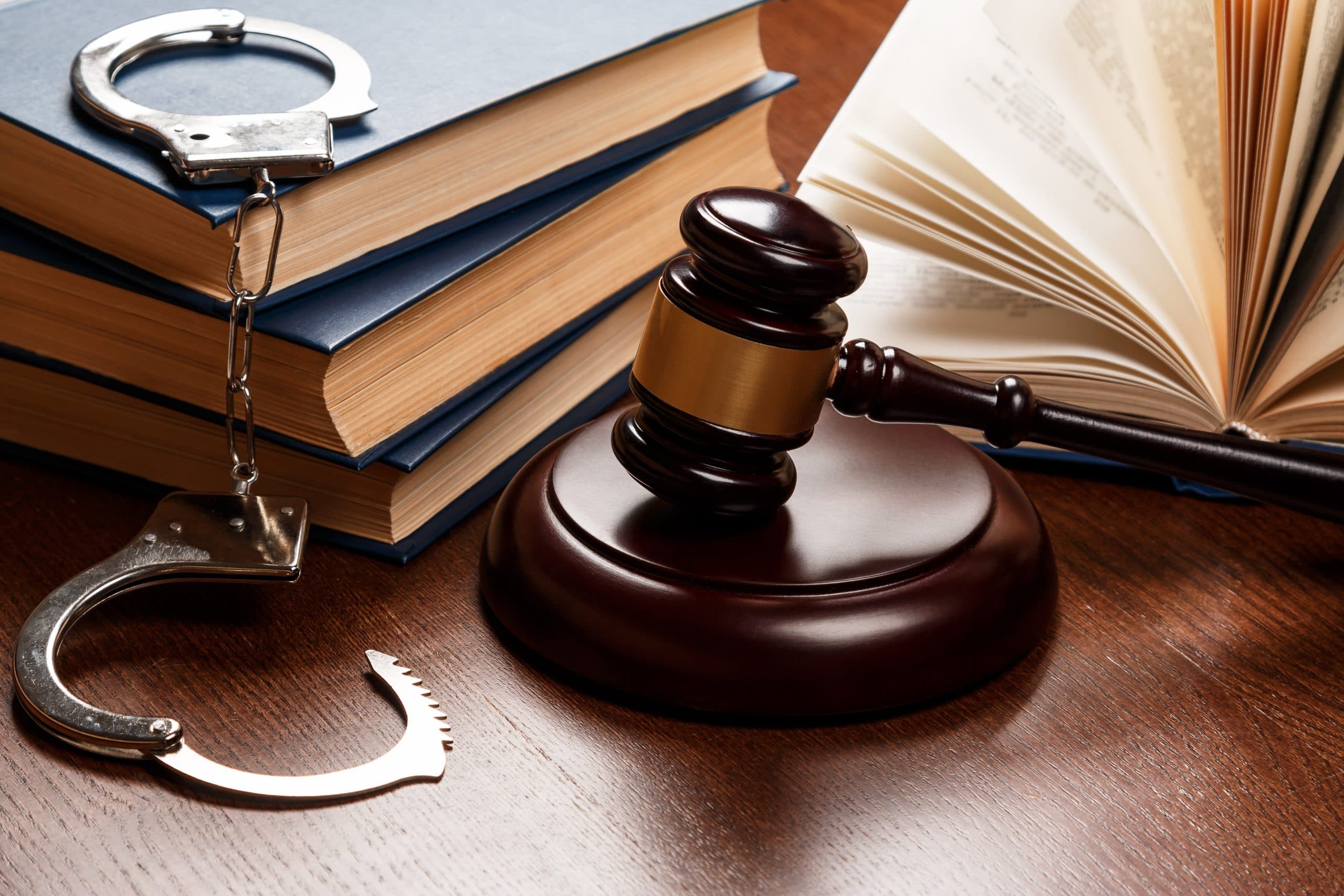
Criminal Justice in Texas: Taking the Stand
The pros and cons of defendant testimony in criminal cases in Texas
The Fifth Amendment to the US Constitution states that no person shall be compelled in any criminal case to be a witness against himself. This right applies to a defendant at his/her jury trial. The prosecution cannot force a defendant to testify. The judge and even the defendant’s lawyer cannot order the defendant to testify. The burden is on the prosecution to be able to prove its case beyond a reasonable doubt without the testimony of the defendant.
Whether you should testify is a critical decision. On the one hand, your testimony gives you a chance to tell your version of what happened. On the other hand, once you testify, the prosecution can cross-examine you – and they’re going to be as strong and difficult as they can. The prosecution will use every trick they can to attack your credibility. At Mary Beth Harrell Criminal Defense and DWI Lawyers, we walk our clients through their options, and help prepare those who will testify in their own defense.
What are the advantages of testifying in my own defense?
Each criminal case is different. Each criminal charge is different. Each judge and jury are different. There’s no golden rule on when a defendant should testify, and when he/she shouldn’t testify.
Some juries may assume, even if they’re not supposed to, that if a defendant doesn’t testify, he/she is probably guilty. They may think that if you were truly innocent, you would express your innocence in person. By testifying, you have a chance to create empathy that can work in your favor, and to remove or limit this prejudice of the juror. Testifying may be advisable for this reason provided that the risks of testifying are less severe than removing the prejudice.
Another reason why you might choose to take the stand is because you have a compelling argument, along with witnesses who can back you up, that you did not commit the crime you’re accused of committing. Putting this evidence and your personal testimony in front of a jury can help create that reasonable doubt and/or convince the jury of your innocence.
One advantage of testifying is the opportunity to “correct the record.” Police reports don’t get everything right, because they’re written by human beings. People make mistakes. For example, if the police report says you assaulted someone outside of a bar, but doesn’t include the part where the guy took a swing at you with a beer bottle first, well – that aggravated assault was really an act of self-defense, wasn’t it? Or maybe it was really just some disorderly conduct. Giving the jury some context about what happened and why is an important part of any defense case, and hearing those words from you, instead of just us, can work to your advantage.
What are the disadvantages of testifying in my own defense?
Life isn’t like the movies, though. The chances of you revealing some hidden truth about “what really happened that day” are slim because you would have already told us. And the truth is that there are some real risks of taking the stand:
- You will be cross-examined by the prosecutor or district attorney. When prosecutors question witnesses on cross-examination, they have more latitude to ask confrontational questions than when they’re asking a witness direct questions. During the cross-examination, the prosecutor will be able to challenge your version of the facts. The prosecutor will be able to challenge your credibility. Even when your version of what happened is accurate, it’s easy to become flustered when a prosecutor is aggressively questioning you.
- Juries are “funny” about how they perceive testimony. While the jury selection process will ideally weed out anyone with an agenda, you never know what may trigger a jury member to form an opinion about you, and be guided by that opinion when it’s time to render a decision.
- The burden of proving your guilt is on the prosecution. You don’t need to prove that you’re innocent. By testifying, you may give the prosecution a chance to prove its case when – if you had stayed silent – the prosecution wouldn’t have the evidence they need for a conviction. Instead of the case being about, “What did the prosecution prove?” the case becomes about whether your testimony is credible.
- A change in the burden of proof. By testifying, you may actually put the thought in the jury’s mind that you have the burden of proof instead of the prosecution.
A quick note about “pleading the Fifth”
You ever see a television show where someone is on the stand and they say “I plead the Fifth”? It’s short for invoking your Fifth Amendment right not to self-incriminate.
That scenario does not happen. You have every right not to self-incriminate, but it never happens on the stand. That is because you would have to invoke this right to not testify before the trial begins. If you decide to testify in your own defense, you are waiving that right. If you “plead the Fifth,” you will not take the stand.
The rules are different for witnesses, however. They may choose to invoke their Fifth Amendment rights if they have been compelled (via a subpoena) to testify.

What factors help decide whether to testify in my own defense?
One key factor that may force your hand when it comes to testifying is the testimony of eyewitnesses. If a police officer, an owner of a store who saw you take property, or a victim who says “You’re the person who struck me or pointed a weapon at me” testifies – that eyewitness testimony can be pretty damaging. You may feel obligated to testify in your own defense.
But don’t be too sure. There are reasons why eyewitness testimony may be unreliable. We do have the right to cross-examine eyewitnesses about what they really saw, and why their eyewitness accounts may be inaccurate. These reasons may include, for example:
- The stress of the situation may make the witnesses’ accounts unreliable.
- The witnesses may have a reason to lie.
- The witnesses may not have had the time or opportunity to actually look at you.
If the eyewitness’ testimony is still damaging after our cross-examination, then depending on what actually happened and all other factors, it may be advisable for you to try to rebut their accounts.
The decision to testify also depends on what types of witness you’ll make – independent of the facts of the case. Often, there’s a fine line. If you show anger, the jury may not like you. If you don’t show anger, the jury may think you’re cold and unfeeling. Sometimes, it’s actually the person who is guilty who gives a better impression because he/she isn’t surprised, while an innocent person’s surprise may become a sign of guilt in a juror’s mind.
Jurors will be looking at your reactions during the trial. If there’s a sense that jurors are uncomfortable with you, even though you haven’t said anything, then testifying may be a way to rebut that discomfort.
How can you prepare me for taking the stand?
Our defense lawyers will review these risks. We will conduct a dry run with you, too, to determine what type of impression you’ll make. The dry run may be monitored by professionals who analyze the impact of any type of testimony.
This is part of “trial prep,” and it can take a long time. The most common form of your trial prep involves us asking you questions – including what we anticipate the prosecutor will ask – over and over and over again until we are confident you can tell your side of the story accurately and truthfully. This can be hard for people because that urge to explain is so deeply ingrained in us – but it can hurt your case by providing a way for the prosecutor to use your own words against you.
We will also help you with more basic elements of preparing for a trial, like how to stand, how to address the judge, and what you should wear.
Do you have a criminal defense lawyer near me?
We meet clients at our offices in Killeen and Copperas Cove. Our primary office is in Killeen at 701 W Central Texas Expressway. We also make arrangements to meet clients who are in custody, or who have access to phone or video consultations.
Our lawyers are skilled at helping folks decide whether it’s wise or unwise to testify in court. We always advise clients to remain silent before their trial. That’s our job – to speak for you.
Speak with a seasoned Killeen criminal defense lawyer now
At the Mary Beth Harrell Criminal Defense and DWI Lawyers, our criminal defense lawyers have been defending clients for 25 years. We understand the many different factors that defendants need to consider before they decide to testify. If you do decide to testify, we conduct trial runs so the defendant can anticipate the questions the prosecution is likely to ask. From the moment of an arrest, indictment, or suspicion of your involvement, our tough criminal defense lawyers are ready to present the strongest defense possible. Contact us today by phone or complete our contact form to schedule an appointment in our Killeen office. We help clients throughout all of Central Texas, including Temple, Belton, Copperas Cove, Harker Heights, and Waco, as well as McLennan, Coryell, and Bell Counties.

